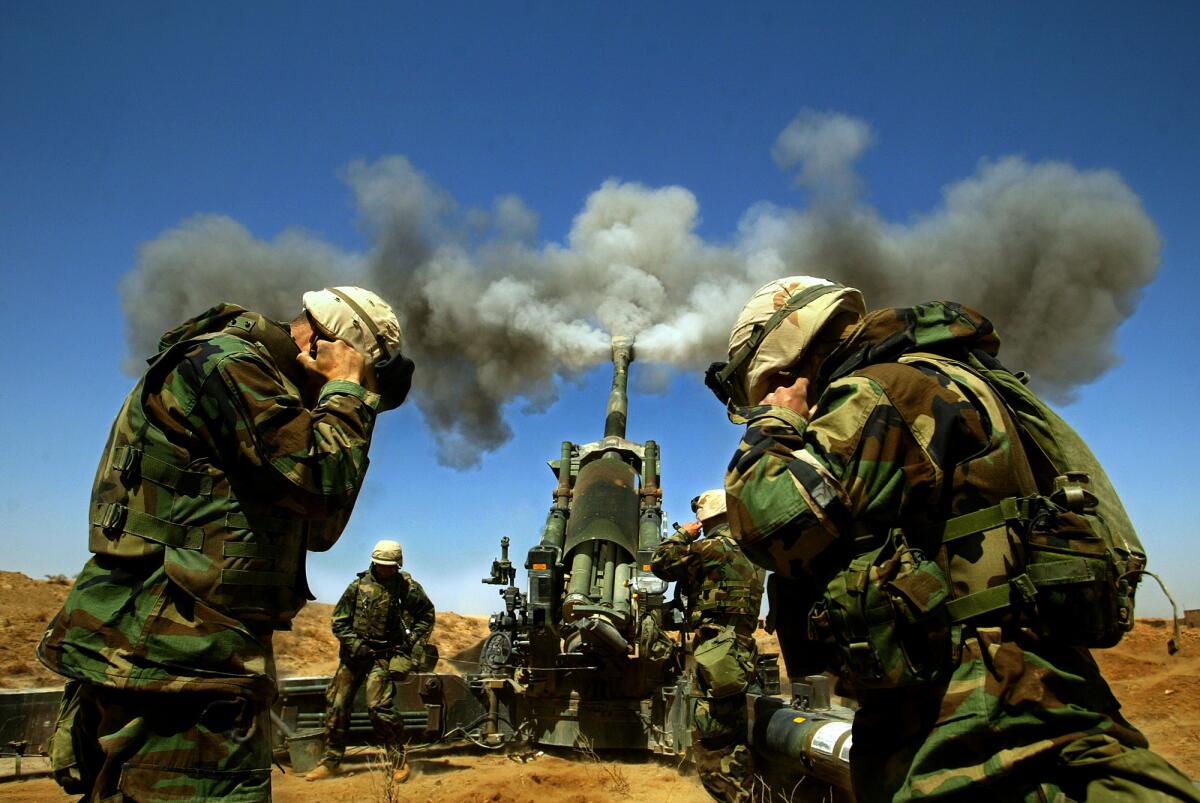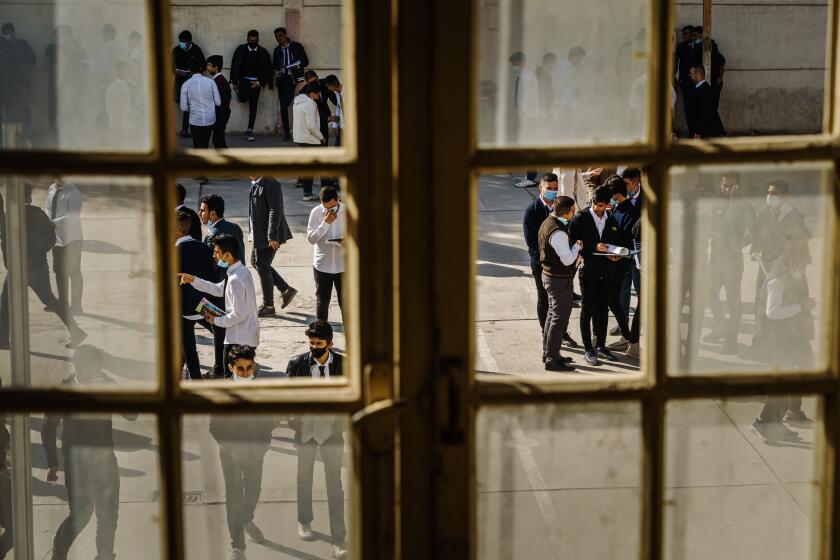Two decades after start of Iraq conflict, Congress poised to repeal war authorization

- Share via
WASHINGTON — Matthew Hoh was a 28-year-old Marine captain assigned to the Pentagon in late 2002, just as President George W. Bush was laying the groundwork for war in Iraq. Like many of his generation, Hoh was steeled in his patriotism by the Sept. 11, 2001, terrorist attacks, and he was eager to serve.
It was widely assumed at the time that the war would be swift and decisive. Hoh worried it would be over before his tour at the Pentagon freed him up to head to combat, and he’d miss his chance.
But the war would drag on eight more years. And 20 years later, it still weighs on Iraqis whose lives were destroyed and a Middle East that remains convulsed, along with Americans shocked at the humanitarian and moral disaster it became and the balance of power it wrought in Washington.
Now, Congress is poised to remove from the books the law that authorized the Iraq war, a step that would formally end the conflict.
“Here I am 20 years later and still talking about it today,” Hoh said. He eventually got his turn to serve in Iraq — two tours, in fact, and a third in Afghanistan as a civilian working for the State Department — and today is part of a campaign to repeal the law known as the Authorization to Use Military Force.
The law authorized Bush to eventually send tens of thousands of military service members into Iraq, starting on March 20, 2003. Because the law is still in place, presidents can and have used it to conduct other military operations technically not covered under the authorization. Normally, under the U.S. system, only Congress can declare war.
The repeal effort is also targeting a similar 1991 authorization that gave President George H.W. Bush permission to start the Persian Gulf War, which was aimed at ejecting Iraqi invaders from Kuwait. That law is also still on the books.
Sen. Tim Kaine (D-Va.), a lead proponent of the repeal, said both laws are “outdated and unnecessary.”
“Congress has a constitutional and moral responsibility to repeal them so that future presidents can’t use these authorizations as a blank check to send service members into harm’s way,” Kaine said after the repeal measure cleared Senate committee hurdles and headed for a vote by the full chamber.
In 2020, President Trump used the authorization to justify the killing of Iranian Maj. Gen. Qassem Suleimani, who was in Iraq at the time.
The repeal bill has enjoyed bipartisan support in the Senate and is likely to pass when the vote comes up within the next days.
In the House, however, it’s a different story.
Some hard-right Republicans in that chamber appear to favor, at least philosophically, returning war powers to Congress. Other GOP House members, however, have argued that a sitting president needs flexibility to counter potential attacks from Iran or other enemies.
Lloyd J. Austin III has made an unannounced visit to Baghdad days before the 20th anniversary of the U.S.-led invasion that ousted Saddam Hussein.
It is not yet clear how House Speaker Kevin McCarthy (R-Bakersfield) will herd his members.
“Just because a bill passes in the Senate doesn’t mean it comes directly to the floor,” McCarthy said last week, stating the obvious while dousing expectations. Then during the House Republicans’ Orlando, Fla., retreat this week, McCarthy signaled support for the repeal but said it would go through the committee process, which could take days or weeks.
George W. Bush gave as justification for the war in Iraq what he claimed was intelligence showing that dictator Saddam Hussein was developing weapons of mass destruction. None were ever discovered.
About 4,500 Americans were killed in the Iraq war; the death toll for Iraqis has been estimated to be as high as half a million. The brutal Hussein was toppled, eventually captured and executed by an Iraqi tribunal. But the U.S. invasion, followed by a long, stultifying occupation, gave rise to more insurgency, including the Islamic State that terrorized people throughout the region and beyond, especially in Iraq.
For much of the world, Iraq is a distant tragedy. But for its children raised amid chaos and war, that legacy has defined their generation.
President Obama finally ended the bulk of combat operations in 2011. About 2,500 U.S. personnel remain in Iraq, mostly dedicated to counterterrorism operations. Iraq and the U.S. are formally partners with full diplomatic ties, making a war decree hanging overhead all the more off-key.
Proponents of the repeal contend that restoring war powers to Congress would produce more scrutiny and transparency in the lead-up to and execution of U.S.-
directed conflict.
The Founding Fathers intended it this way, reasoning that the executive branch will always be more inclined to go to war and the legislative branch provides a necessary counterweight, Kaine said.
Kaine recalled that he thought the justifications being offered for the war in Iraq at the time seemed questionable and said Congress had to take a more proactive role.
“We owe it to our service members to fulfill our constitutional obligations and vote to end endless wars,” Kaine said.
Repealing the law “is vital to restoring the proper role of Congress in authorizing the use of military force and affirmatively stating when conflicts are over,” said Sen. Todd Young (R-Ind.), who co-sponsored the bill with Kaine. Young served three tours in Iraq as a Marine Corps officer.
Hoh said he became disillusioned and embittered by the wars and occupations in Iraq and Afghanistan, and the traumatic tolls they have taken on those involved. He also witnessed the waste of millions of dollars in Iraq reconstruction aid that was instead directed toward security efforts, including private contractors and militias, and the corruption that sapped any hope for healing in the ravaged country.
The result, Hoh said, was “tremendous death, destruction and the ruination of a society.”
He sees the repeal as a limited but important way to change the conduct of the decision-making that leads to war.
The repeal “would be the first step, out of many steps, to establish accountability for a war that should not have happened,” Hoh said.
“Congress abdicated its responsibility for war-making and they haven’t stood up for themselves. They got a war that was pushed on them ... a war of choice, a war based on lies.”
More to Read
Get the L.A. Times Politics newsletter
Deeply reported insights into legislation, politics and policy from Sacramento, Washington and beyond. In your inbox twice per week.
You may occasionally receive promotional content from the Los Angeles Times.













